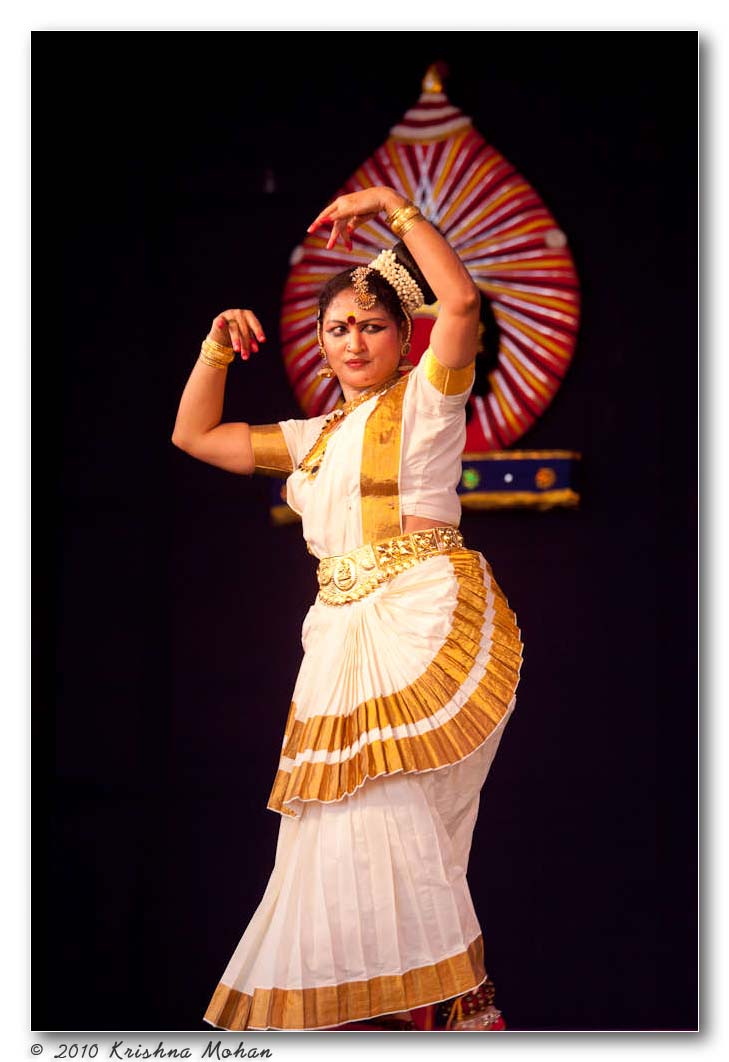
Early rains might have evaded our town and the temperature soured to a new high. We were to experience a different form of rain in the form of Mohiniyattam. On the event of Mantapa Prabhakara Upadhya’s 1000th Performance of Ekavyakti Yakshagana celebration we were treated with an unique Mohiniyattam performance by Vinitha Nedungadi on 2nd April at Alva’s.

Vinitha Nedungadi is a leading exponent of Mohiniyattam. Referred to as the dance of the enchantress, Mohiniyattam is a gracefully elegant classical dance form with lasya as the predominant element. Kerala’s native dance form Mohiniyattam, true to its name, is characterized by slow, fluid movements and poetic stances.

Vinitha is daughter of Sri. P. Narendranath, an accomplished Malayalam Writer. Karukare karmukil… by Kavalam, Poothappattu… by Edassery, translation of to Tagore’s Gitanjali by Mahakavi G etc, are some of Vinitha’s endeavors in adapting mainstream poems to Mohiniyattam. The huge success of these items became a trendsetter and inspired other dancers to look into the treasure trove of Malayalam poetry.

Vinitha studied Bharathanatyam under reputed teacher Kalamandalam Renganayaki. Then learned Mohiniyattam under the tutelage of Ramakrishnan Nair and Kalamandalam Kshemavathy. After completing her Graduation in Commerce from M G University, She joined Kerala Kalamandalam for Masters in Mohiniyattam. You can see typical Kalamandalam style in her Mohiniyattam performances.

In Varshamohini or Navarasas of the rain where Vinitha has dared to think beyond thouryathrika concept of dance and eventually proved the power and possibilities of Mohiniyattam. (The combination of nritya, vadya and geeta is known as touryathrika.) Varshamohini is a new concept in Mohiniyattam, using only instrumental music to support the dance. Even though the Sahithya (lyrics) is absent, the body language which is strictly within the traditional limits, beautifully conveys all the Rasas.

Mohiniyattam which predominantly Sringara or Viraha Rasa dominant dance form with almost no Veera rasa. But in Navarasas of the rain Vinitha conveyed all the nine rasas equally well thus producing an endearing effect.

When the cloud is heavy with water droplets it wanders, it is carried away by the wind and on its way encounters mountain ranges. Then it gets frightened(Bhayanaka). When it is chilled, it showers down as pitter-patter raindrops and the rain seems to be extremely happy(Hasya).

It falls on the meadows and valleys changing them wonderfully(Adbhuta). When the sun shines, rain blushes and falls in love (Sringara) with it. Some-times rain assumes the form of torrential rain (Veera) accompanied by thunder and lightning (Raudra).

At times, rain passes through sandy deserts rain expresses disgust(Bhibatsa) and then pity (Karuna). Then rain consoles the earth and assumes the bhava of serenity (Shantha).

I used Canon EOS 5D mark II & Canon EOS 7D with both Canon EF 70-200mm f/4.0 L IS USM & Canon EF 300mm f/4.0 L IS USM lens to photograph this Mohiniyattam.

You can check the other photos in this slide show.
[svgallery name=”mohiniyattam”]


??????? ????????? ???? ????? ??????? ????? ???????????? ??????? ?????? ??????????. ???????? ?????? ???????? ???????????? ??????? ????? ?????????? ??????? ????. ( photoshop????? ???????? ?????? ?????????, ???? ??? ?????????? ???????? ???????? ????????? ). ???? ?????? ????? ??????????? ? ???????????? ????? ??????????? ??????????????. ????????????? 300 ??????????? ??? 40 ??????????? ????? ??????????? ???? ???.
???? ????? ?????????? ????????????? ????????????? ???????????
?????????
Amazing expressions! And timely captured! 🙂
Thank you Nayan
Krishna mohan
?????????? ??????????,?????? ???????? ????????? ?????? ???????????? ???????? ????? ???? ????? ???? ??????? ???.
???? ??????????? ????? ????? ???? ?????
????? ????????
??????? ????? ????????????? ?????? ‘???’ ???? ????????
Beautiful set of images depicting all the Rasa’s being enacted by the dancer. Apart from being all images beautiful, they are tutorials in themselves to how to capture a dance sequence and what to postures and mudras to look for and anticipate. Thanks a lot for sharing and showing the way.